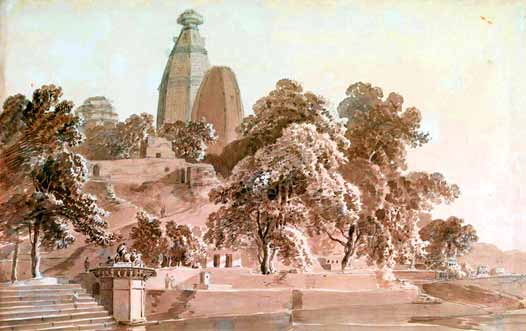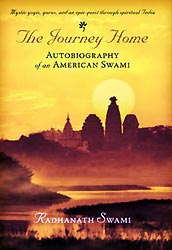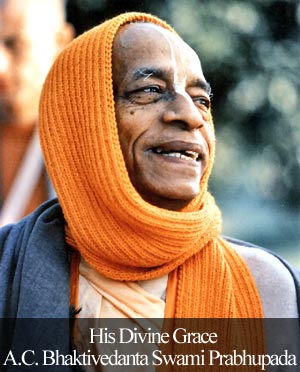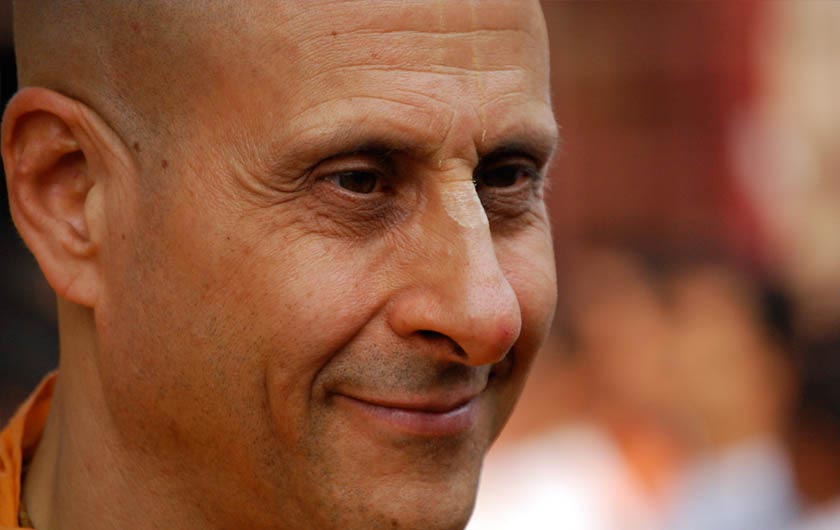
Radhanath Swami ‘accidentally’ (or so, it appears to my ordinary vision) lands up at Mathura, on his way to Amarnath. Promising Gary he’d meet him a few days later, Richard (now Radhanath Swami) then goes alone to Vrindavan.
I find it somewhat amusing to read Radhanath Swami’s first experiences in Vrindavan. He meets friendly and loving people, especially a farmer, who gets desperate and insists on offering his loving service to him. I can’t help feeling humbled on reading Radhanath Swami’s description of Vrindavan and its residents. I too visited Vrindavan many years ago with my family. During this first visit, I thought I met some unfriendly men, and in some temples felt the priests aggressively soliciting for money. As the saying goes, ‘beauty lies in the eyes of the beholder’. Since Radhanath Swami is very charming, humble and sweet, he feels all vrajwasis (residents of Vrindavan) are same. I am sure that’s the way they are, but my hard heart sees with a material vision. Even at other places, the sweetness of the culture and love and warmth Radhanath Swami received from the locals has left an indelible impression in his heart. Radhanath Swami writes in ‘Journey Home’ that seeing the natural beauty of Vrindavan, temple bells resounding and children singing Krishna’s names, he felt finally after more than a year of wandering, he’s found home again.
I once heard Radhesh Lal Goswami, the head priest of Radha Vallabh temple, one of the prominent temples of Vrindavan say that Radhanath Swami should have been born in Vrindavan, but somehow he took birth in Chicago. With a mischievous smile the head priest said, “Maybe God also makes a mistake sometimes, that he puts his loving devotees in a different place than He intends to.” I cautioned myself not to subscribe to his opinion about God making a mistake, but I could appreciate his sentiment. He found Radhanath Swami’s character and traits as natural as any Vrajwasi that he couldn’t fathom how such a soul as Radhanath Swami could be not born and raised in Vrindavan. At another place I chanced to see Radhanath Swami’s exchanges with other vrajwasis, some elderly and not knowing English. But Radhanath Swami is completely at home with them as they too feel at ease sharing love and laughter joyfully.
Externally Vrindavan appears no different from other North Indian villages. I guess it requires a divine vision (which I am sure Radhanath Swami has) to see Vrindavan the way he perceives it. I once heard that we see and perceive everything in this world according to our limited senses. If we have an ordinary vision, we will find the most spiritual place as ordinary, whereas one whose eyes are anointed with the salve of love will see God even in the most ordinary place. What then to speak of the holy place of Vrindavan being perceived by a holy person, Radhanath Swami. This powerful combination can be spiritually exhilarating.
That’s why the mauni sadhu, one who has taken a vow never to speak, communicated to Radhanath Swami by scratching on a slate that people of Vrindavan are crazy for Krishna and if Richard (now Radhanath Swami) stayed there, he too would soon become crazy. Holy places carry spiritual energy, and one whose consciousness is fine tuned with a prayerful attitude, quickly catches these vibrations. Richard was now all set to experience the spiritually electrifying vibrations of Vrindavan.
 Table of Contents
Table of Contents

 Founder-acharya of the International Society For Krishna Consciousness (ISKCON)
Founder-acharya of the International Society For Krishna Consciousness (ISKCON) “Go to India” a sweet but commanding voice; spoke up in the heart of young Richard (later Radhanath Swami) who was immersed in meditation, his search for meaning in life has brought him to the Isle of Crete. Today he was ordered to go to India. Born and raised in the middle class suburbs of Chicago, Radhanath swami grew up in the 1950’s and 60’s era when popular musicians protested war, prejudice and social injustice. Radhanath swami would listen to these songs again and again, but their lyrics referring to God stirred his soul. Peter, Paul and Mary- the folk trio from Greenswich village sang in their debut album
“Early in the morning, about the break of day
I ask the Lord, to help me find my way”
This simple prayer was to guide Radhanath swami in the coming years of his life........
“Go to India” a sweet but commanding voice; spoke up in the heart of young Richard (later Radhanath Swami) who was immersed in meditation, his search for meaning in life has brought him to the Isle of Crete. Today he was ordered to go to India. Born and raised in the middle class suburbs of Chicago, Radhanath swami grew up in the 1950’s and 60’s era when popular musicians protested war, prejudice and social injustice. Radhanath swami would listen to these songs again and again, but their lyrics referring to God stirred his soul. Peter, Paul and Mary- the folk trio from Greenswich village sang in their debut album
“Early in the morning, about the break of day
I ask the Lord, to help me find my way”
This simple prayer was to guide Radhanath swami in the coming years of his life........
Very inspiring article by Radhanath Swami…. Thanks for sharing
View CommentThank you Radhanath Swami for connecting us to Vrindavan
View CommentRadhanath Swami is carrying Vrindavan in his heart. If you want to see Vrindavan, just hear him!
View CommentMaharaj ji is always in Vrindavan whereever he is due to his intense love for Krishna and also intense desire to Him. So he is naturally resident of Vrindavan.
View CommentVery inspiring article
View CommentThere’s no controversy about where Radhanath SWami is from regarding his being a Vrajwasi or a Chicagowasi.
Wherever there’s love for Krishna, there’s Vrindavan. Swamiji was born in Chicago, perhaps due to Lords desire to link the East and the west.
Haribol
View Comment